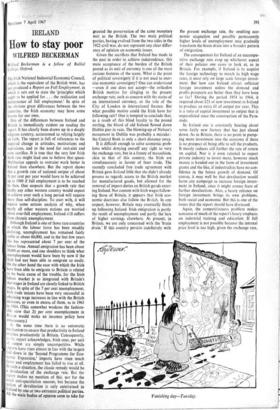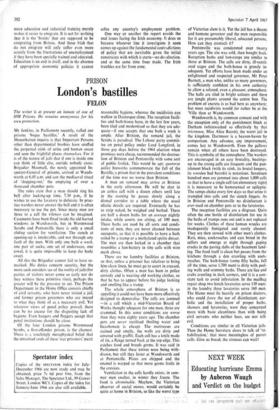How to stay poor
IRELAND WILFRED BECKERMAN
Wilfred Beckerman is a fellow of Balliol College, Oxford.
The Irish National Industrial Economic Council, which is the equivalent of the British NEDC, has just produced a Report on Full Employment, in which it sets out to state the 'principles which ought to be applied for . . . the realisation and maintenance of full employment.' In spite of the obvious great differences between the two countries, the Irish economy may have some lessons for our own.
One of the differences between Ireland and Britain is immediately evident on reading the report. It has clearly been drawn up in a deeply religious country, accustomed to relying largely on faith. The report is full of references to the required change in attitudes, motivations and aspirations, and to the need for restraint and even sacrifice. It is true that the very low Irish birth rate might lead one to believe that quasi- Malthusian appeals to restraint work better in Ireland than elsewhere. But the report shows that a growth rate of national output of about 51 per cent per year would have to be achieved up to 1980 if full employment is to be reached by then. One suspects that a growth rate that hardly any other western country would expect to achieve over such a long period will require more than self-discipline. To start with, it will require some serious analysis of why, when nearly all other western nations are worried about over-full employment, Ireland still suffers from chronic unemployment.
Although Ireland is one of those rare countries in which the labour force has been steadily declining, unemployment has remained fairly stable at about 60,000, and in the last few years this has represented about 7 per cent of the labour force. Annual emigration has been about 30,000 or more, and one shudders to think what unemployment would have been by now if the Irish had not been able to emigrate so easily. On the other hand the ease with which the Irish have been able to emigrate to Britain is related to the basic cause of the trouble, for the Irish labour market is so integrated with Britain's that wages in Ireland are closely linked to British wages. In spite of the 7 per cent unemployment, Irish trade unions have been very successful in obtaining wage increases in line with the British increases, or even in excess of them, as in 1961 to 1964. (This somewhat weakens the fashion- able view that 2f per cent unemployment in Britain would make an incomes policy here unnecessary.)
At the same time there is no automatic mechanism to ensure that productivity in Ireland matches productivity in Britain. Consequently, as the report acknowledges, Irish costs per unit of output are simply uncompetitive. While exports have risen almost in line with the targets hid down in the 'Second Programme for Eco- nomic Expansion,' imports have risen much faster and employment has failed to rise at all. In such a situation, the classic remedy would be a devaluation of the exchange rate. But the report makes no mention of this, not for the usual anti-speculation reasons, but because the notion of devaluation is only entertained in Ireland by one or two extremist political parties. Al the main bodies of opinion seem to take for granted the preservation of the same monetary unit as the British. The two main political parties, having evolved from the two sides in the 1922 civil war, do not represent any clear differ- ence of opinion on economic issues.
Given the sacrifices that Ireland has made in the past in order to achieve independence, this mute acceptance of the burden of the British pound as its unit of currency is one of the most curious features of the scene. What is the point of political sovereignty if it is not used to exer- cise economic sovereignty? One can understand —even if one does not accept—the orthodox British motives for clinging to the present exchange rate, such as concern with the status of an international currency, or the role of the City of London in international finance. But what possible motive could the Irish have for following suit? One is tempted to conclude that, as a result of this blind loyalty to the pound sterling, the blood of old Ireland flowed down Dublin pier in vain. The blowing-up of Nelson's monument in Dublin was probably a mistake: the Central Bank is only a short distance away.
It is difficult enough to solve economic prob- lems whilst denying oneself any right to vary the exchange rate, but in a frenzy of masochism, akin to that of this country, the Irish are simultaneously in favour of freer trade. The recently concluded free trade agreement with Britain gave Ireland little that she didn't already possess as regards access to the British market for manufactured goods, but allowed for the removal of import duties on British goods enter- ing Ireland. Not content with Irish wages follow- ing those of Britain, it appears that Irish eco- nomic doctrines also follow the British. In one respect, however, Britain may eventually finish up following Ireland. Irish emigration is partly the result of unemployment and partly the lure of higher earnings elsewhere. At present, in Britain, we are only concerned with the 'brain drain.' If this country persists indefinitely with Vanishing day—Tuesday. the present exchange rate, the resulting eco- nomic stagnation and possible permanently higher levels of unemployment may gradually transform the brain drain into a broader pattern of emigration.
The consequences for Ireland of an uncompe- titive exchange rate crop up whichever aspect of their policies one cares to look at, as in Britain. For example, if Ireland is to acquire the foreign technology to match its high wage rates, it must rely on large scale foreign invest- ment. But how can Ireland attract sufficient foreign investment unless the demand and profits prospects are better than they have been so far? During the period 1954 to 1964, it required about £23 of new investment in Ireland to produce an extra fl of output per year. This is a ratio of capital investment to output that is unparalleled since the construction of the Pyra- mids.
In Ireland one is constantly hearing about some fairly new factory that has just closed down. As in Britain, there is no point in pump- ing more investment into the economy if there is no prospect of being able to sell the products. It merely reduces still further the rate of return on capital. Nor is it even rational to expect private industry to invest more, however much money is handed out in the form of investment grants and the like, if industrialists have no con- fidence in the future growth of demand. Of course, it may well be that devaluation would harm any campaign to increase foreign invest- ment in Ireland, since it might arouse fears of further devaluations. Also, a heavy reliance on foreign investment brings its own problems, both social and economic. But this is one of the issues that the report should have discussed.
Again, the competitiveness problem makes nonsense of much of the report's heavy emphasis on industrial training and education. If full employment is not possible because the internal price level is too high, given the exchange rate, more education and industrial training merely makes it easier to emigrate. It is not for nothing that it is the 'brains' that are supposed to be emigrating from Britain. And those Irish that do not emigrate will only suffer even more acutely from the frustrations of unemployment if they have been specially trained and educated. Education is an end in itself, and in the absence of appropriate economic policies it cannot solve any country's employment problem.
One way or another the report avoids the real issues facing the Irish economy. It does so because whatever line it investigates it soon comes up against the fundamental contradictions of policy that are inevitable given the initial constraints with which it starts—no devaluation, and at the same time freer trade. The Irish troubles are far from over.































 Previous page
Previous page